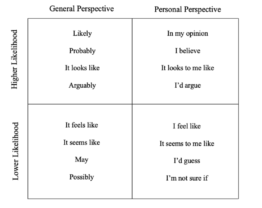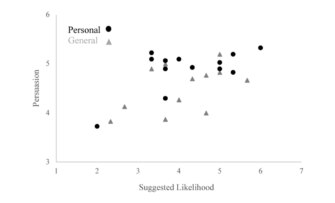I Think, Maybe
Conversational hedges are words or phrases indicating uncertainty, tentativeness, or modesty in a conversation. Words like “maybe,” “I think,” or “I’m not sure”.
What role do they play? They can make the speaker appear more credible and trustworthy by acknowledging uncertainty.
Hedges can also make the speaker seem less pushy, which in turn makes the listener more receptive to the speaker’s arguments. And they can make the speaker’s arguments more compelling. By presenting ideas tentatively, the speaker invites the listener to consider the merits of the argument and arrive at their own conclusions.
This can make the listener feel more invested in the conversation and more likely to be persuaded.
But, are all hedges the same? Recent research from Berger and Oba at Wharton suggest not. They hypothesized two dimensions of hedges that impact persuasiveness,
- Qualitative Degree of Likelihood Suggested – e.g., I believe suggests higher likelihood than I feel like.
- Pronouns and Personalization – e.g., Do you own it with first person “I, Me” or not?

They tested this in a variety of experiments and found that Owning it with first-person pronouns and making it seem more likely make it more persuasive to the reader or listener. Persuasion increases as,
- Degree of Expressed Likelihood goes up (X axis and up and to right plot of dots)
- Use 1st person to own it (solid dots higher than the triangles)

This is magnified if the speaker is deemed an expert or relevant on the topic, which is kinda the definition of who ought to be “writing”, errr, signing our appeals.
The reader assumes (usually incorrectly) the signer wrote the letter. Our job is to make it feel that way. One way to do this is by making sure the signer comes across as persuasive and compelling by using first person and sharing beliefs and opinions.
The double bonus is “think”, “feel”, “want” are private verbs that make the copy feel more like a personal exchange and help your Readability Score (per Copy Optimizer).
Kevin



I’m wondering about “I think” which doesn’t appear in the matrix above. Every time I hear a woman use this phrase, I personally find it diminishes her power and authority. Especially when it precedes something that is definite. E.g. “I think the XYZ legislation is needed.” Why not just “It has been proven in other cities that XYZ will solve this problems, that’s why my XYZ legislation is vitally important”
Hi Gayle. Thanks for reading and commenting. Much of the earlier research on conversational hedges looked at use of hedges and its relationship to power dynamics. They found hedges are associated with less power. However, that work lumped all hedges together. This work finds a more nuanced, accurate answer. Power, via persuasion, comes from “owning” the hedge (I, me) and stating it more definitely. Said differently, a man or woman is seen as more persuasive if they say “I think the best decision is X” instead of “Arguably the best decision is X”. It may be that there is a male/female dynamic that moderates this effect but males and females still better off owning it and being more declarative. As to whether citing data or evidence helps, one can imagine it does but I’d interpret this research to say one is still better off owning it and doing it declaratively – e.g., I’ve read the research, here’s what it says and this is why I am convinced the best course of action is X”
So agree Gayle! Definitely true!
I try not to say “I think” when I am speaking in person, because it definitely can diminish my authority as a consultant or speaker.
However, I do use “I think” in promotional or fundraising copy, just not orally. Seems to work in that context.
Also, I have been pondering the powerful concept of “personal agency” that Kevin has been discussing lately. Wondering if these two ideas work together. How about that Kevin?
Hi Gail, thanks to you too for reading and commenting. Yes, “I think” in fundraising copy works for two reasons. One, pronouns are positive features of copy that feels more personal. Think of how many times you use “I” in informal (not professional) conversation – a lot. Two, the “think” part is a private verb and is also a part of speech we use all the time when informally talking with friends, family etc. It is also a cue that the author/writer is sharing their thoughts, views and opinions, another positive for copy that feels familiar and personal.
There is research showing that pronoun choice in a professional context is a power signal and maybe not in the direction you’d expect. People with less power in professional setting are more likely to use 1st person pronouns. Those with more power use 2nd person or 3rd. It’s likely those with lesser power in professional setting are using “I” and “my” to create more sense of control.